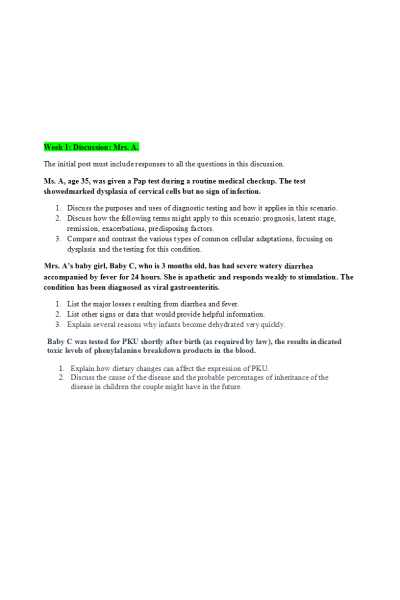NR 283 Week 1 Discussion; Mrs. A, age 35, was given a Pap
-
$15.00
| Institution | NR 283 Pathophysiology |
| Contributor | Stephen |
The initial post must include responses to all the questions in this discussion.
Ms. A, age 35, was given a Pap test during a routine medical checkup. The test showedmarked dysplasia of cervical cells but no sign of infection.
- Discuss the purposes and uses of diagnostic testing and how it applies in this scenario.
- Discuss how the following terms might apply to this scenario: prognosis, latent stage, remission, exacerbations, predisposing factors.
- Compare and contrast the various types of common cellular adaptations, focusing on dysplasia and the testing for this condition.
Mrs. A’s baby girl, Baby C, who is 3 months old, has had severe watery diarrhea accompanied by fever for 24 hours. She is apathetic and responds weakly to stimulation. The condition has been diagnosed as viral gastroenteritis.
- List the major losses resulting from diarrhea and fever.
- List other signs or data that would provide helpful information.
- Explain several reasons why infants become dehydrated very quickly.
Baby C was tested for PKU shortly after birth (as required by law), the results indicated toxic levels of phenylalanine breakdown products in the blood.
- Explain how dietary changes can affect the expression of PKU.
- Discuss the cause of the disease and the probable percentages of inheritance of the disease in children the couple might have in the future.
| Instituition / Term | |
| Term | Fall |
| Institution | NR 283 Pathophysiology |
| Contributor | Stephen |









































